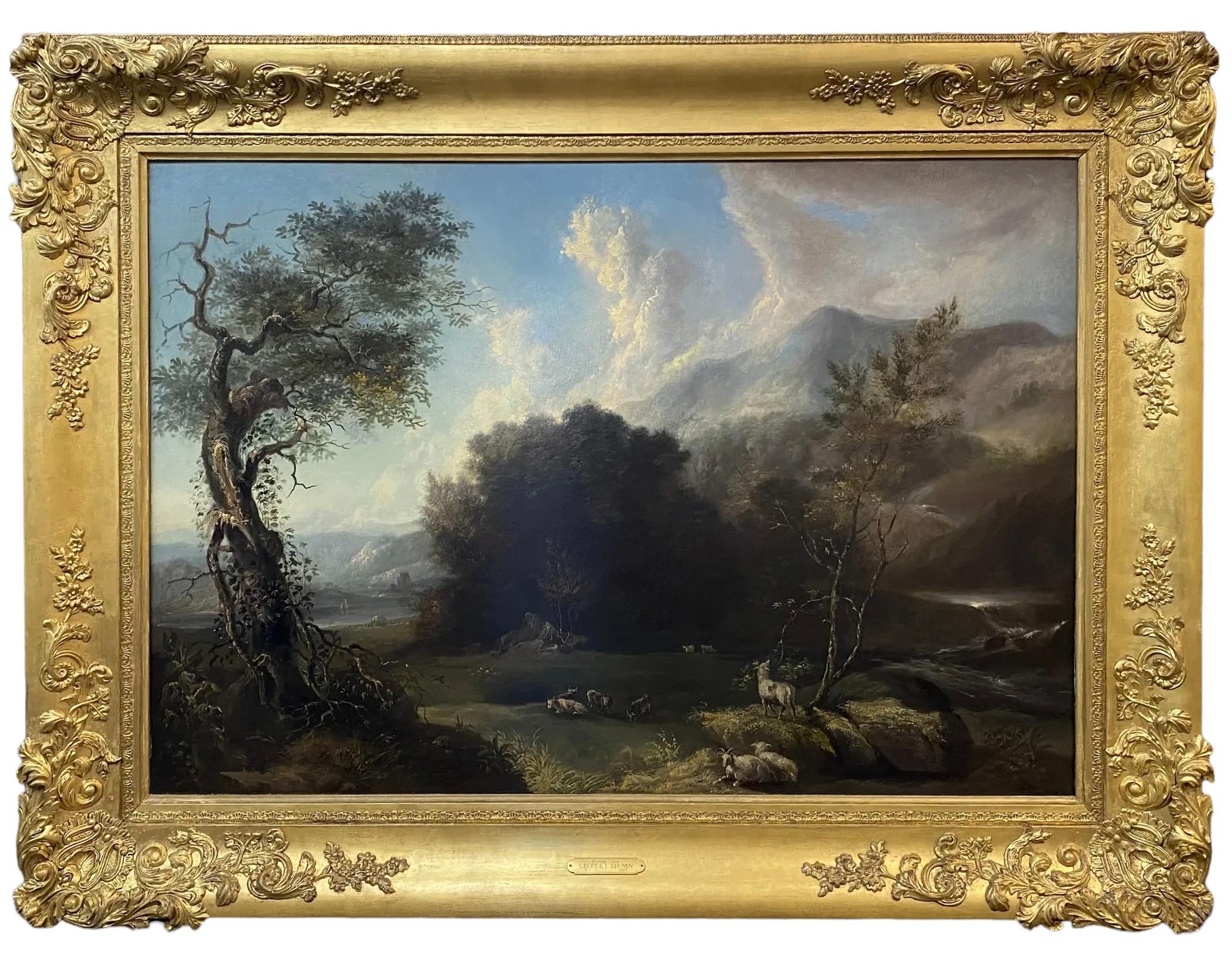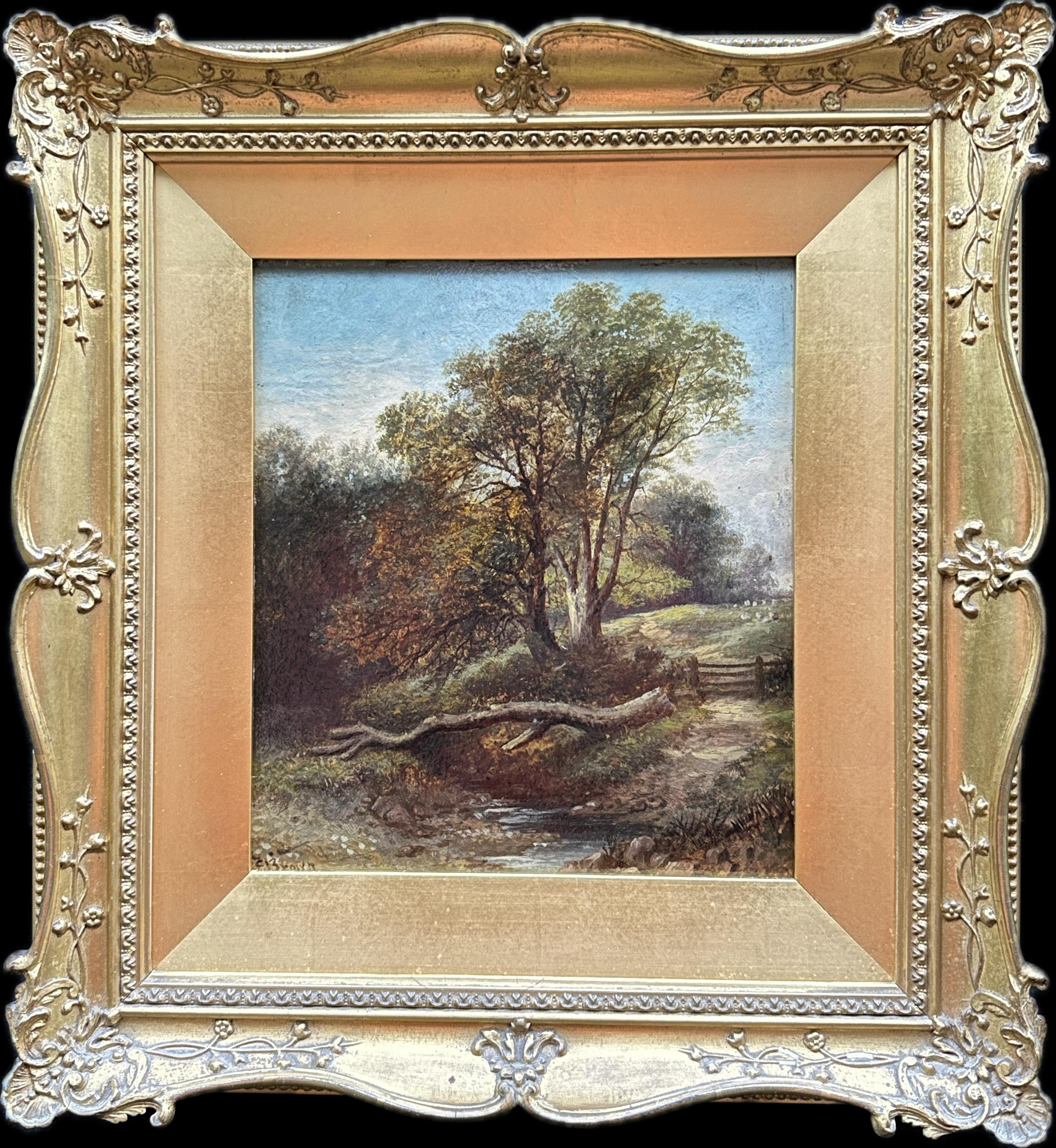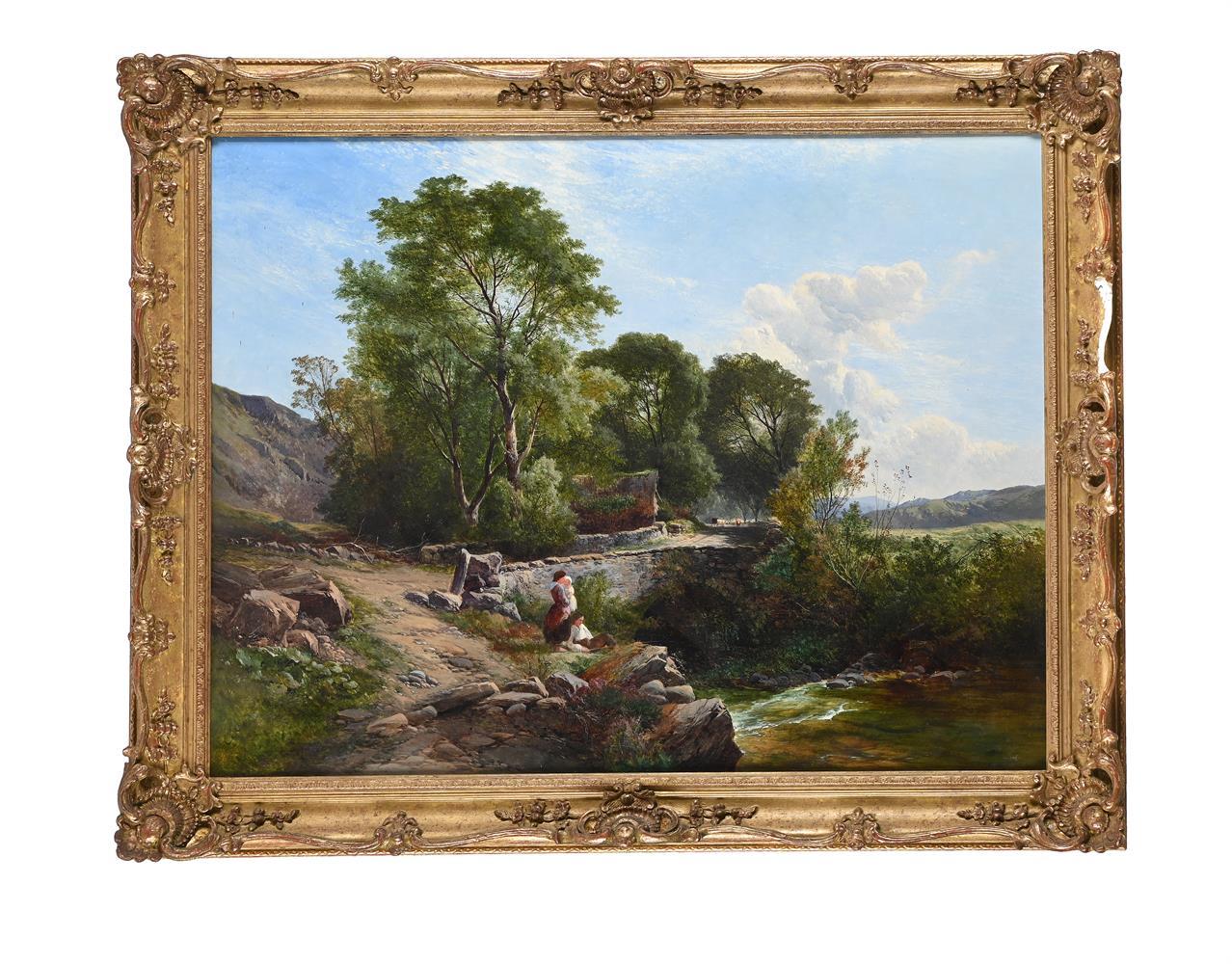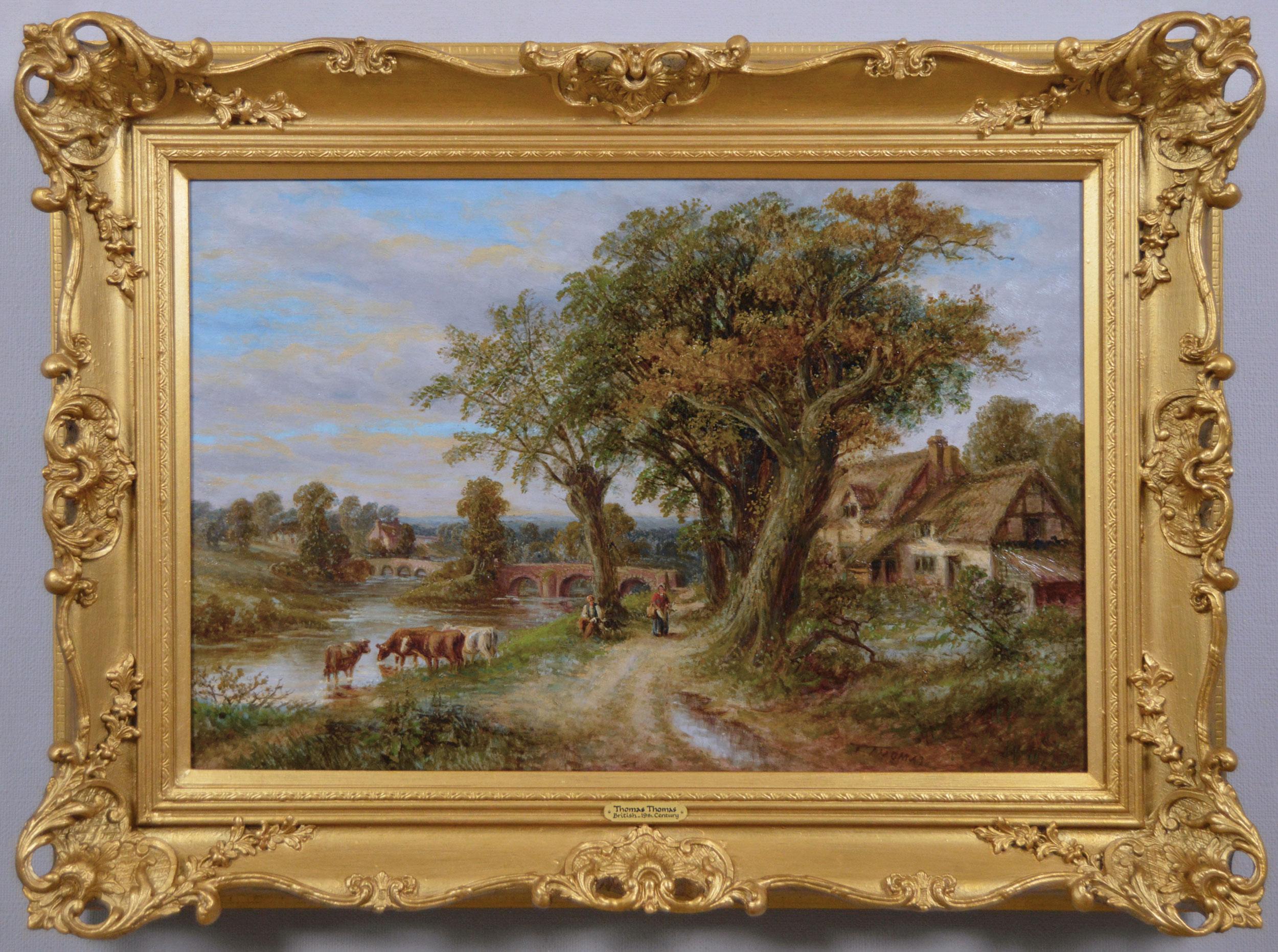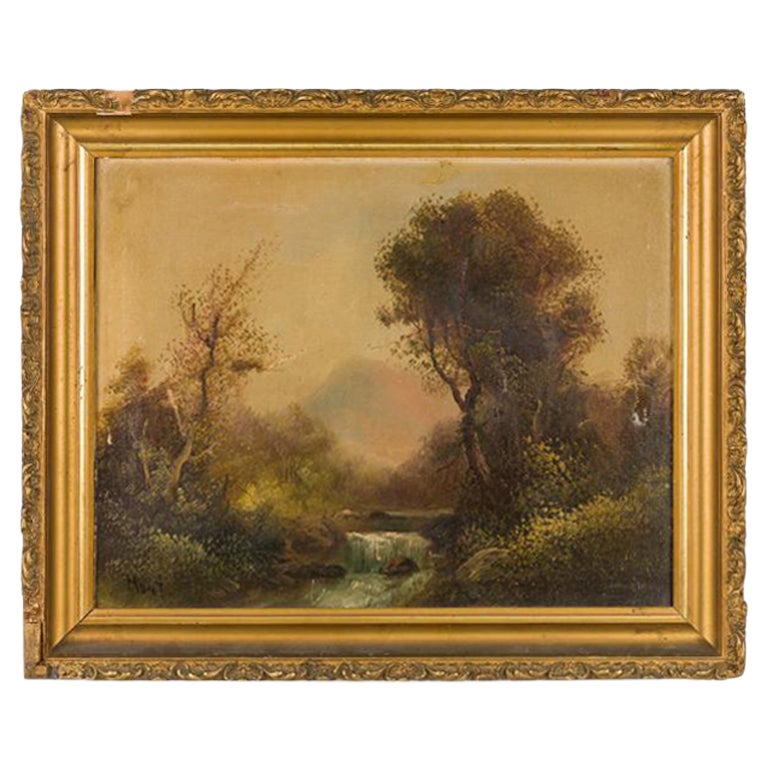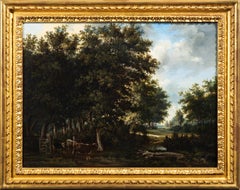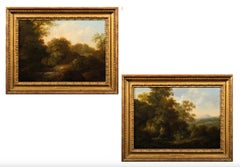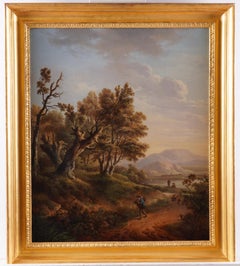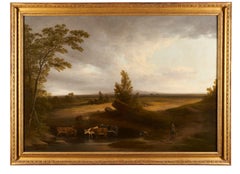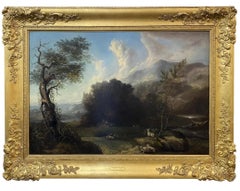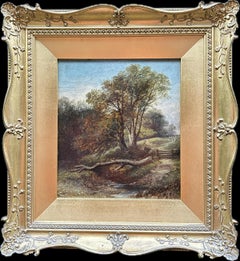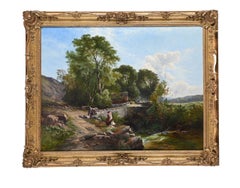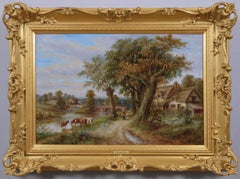Items Similar to Landscape with goatherds near a waterfall
Want more images or videos?
Request additional images or videos from the seller
1 of 16
George Smith of ChichesterLandscape with goatherds near a waterfall
$12,414.31
$16,552.4225% Off
£9,000
£12,00025% Off
€10,602.99
€14,137.3225% Off
CA$17,052.26
CA$22,736.3525% Off
A$18,961.14
A$25,281.5225% Off
CHF 9,926.50
CHF 13,235.3325% Off
MX$231,613.85
MX$308,818.4625% Off
NOK 124,736.23
NOK 166,314.9725% Off
SEK 117,339.42
SEK 156,452.5625% Off
DKK 79,150.60
DKK 105,534.1325% Off
About the Item
George Smith of Chichester (1714-1776)
Landscape with goatherds near a waterfall
Oil on canvas
Signed 'Geo. Smith' lower left
Canvas Size 18 x 25 in
Framed Size 24 x 31 in
Provenance
From the collection of Trevor Lowther Brodrick, 11th Viscount Midleton of Peper Harow (1903–1988);
John Mitchell Fine Paintings, London;
Private Collection, UK
Exhibited
Chichester, Pallant House Gallery, The Smith Brothers of Chichester, May-August 1986, no.31
George Smith was one of three brothers who were all artists in their native town of Chichester in the mid-18th century, and amongst the first native practitioners of the pure landscape. Their style derives ultimately from the exemplars of Claude Lorraine, but with a curiously English air. They enjoyed a great popularity during the third quarter of the 18th century. Of the three George, was the most prolific and successful, and exhibited frequently at the annual exhibitions of the Society of Artists from 1760 until two years before his death, in Chichester, in 1776.
George's elder brother William (1707-1764) had been sent by the Duke of Richmond to London to train at the St. Martin's Lane Academy as a portraitist in c.1725. He was joined by George, his younger brother, three years later c.1728 where he was instructed in painting. In about 1730, the two brothers were invited by the Sir John Guise 3rd bart. to come to Gloucestershire to paint. They remained in the county for some eight or nine years, painting a variety of pictures including an altarpiece for the Guise chapel at his house Elmore (destroyed). Sir John presumably took advice on his choice of painters from his cousin General John Guise, soldier and connoisseur, who own the splendid collection of Old Masters is now at Christ Church college, Oxford. At some point around 1740, George returned to his native Chichester, and like his brother, was encouraged by the 2nd Duke of Richmond (1701-1750) and subsequently by his son Charles, 3rd Duke (1735-1806), the collector and developer of Goodwood. From this date on he painted a long series of rural landscapes in a highly refined and technically advanced style, where the “finish” was dependent on the careful accretion of subtly-toned glazes. There was an active market for his pictures, which were occasionally painted in collaboration with his younger brother John after the death of William in 1764.
For some years George Smith maintained a studio in London, though his paintings seem always to be inspired by his native Arun Valley. The development of the Society of Arts from 1758 led to the introduction in 1760 of a prize (“premium”) of the substantial sum of £50 for the best landscape painted in England in that year of a size 40 x 50 inches. The Duke was an enthusiastic supporter of the SA, though it is doubtful that his influence was paramount in the awarding of the prize to George Smith: the selection of the winner was by ballot on 1st April 1760, and the name of the artist was kept secret from the voters to ensure fairness. The landscapes by George and his brother were neck-and-neck in the voting, the award finally going to George on the casting vote of the chairman Thomas Brand. The winning picture was then exhibited in the Society's new Great Room in the Strand, where it hung in company with Richard Wilson's Destruction of the Children of Niobe. George again won the premium the following year in 1761; his brother John won the next year and George once more in 1762. They were then disqualified from exhibiting, according to the rules, in subsequent years.
Their reputation in London thus established, the brothers returned to their native Chichester, which was experiencing a economic expansion in what were prosperous years, and many paintings were sold to successful tradesman – encouraged, no doubt, by the Duke's example. In 1767, a large landscape was priced at 40 guineas; a small picture was 7 guineas. Gainsborough was receiving similar amounts for landscapes at the time. Lady Sarah Lennox noted the prices George's paintings were fetching after his death in 1776: she reports that the pictures were selling “at a little higher price than they did”, but predicted that they would soon move higher still. She quotes the “large finished pictures” at £60, £40, £30 and £20, but she was still interested in buying the “unfinish't” sketches remaining in his studio.
Smith's critical reputation was at its apogee in the 1760's, and after his death his work fell slowly into first neglect and then obscurity. His first premium painting for which he received 50 guineas was sold in Christies on 10th February 1838 for just 20 guineas. His reputation was revived only in the 1980's when the seminal exhibition at the Pallant House Gallery in Chichester once more drew attention to the masterful technique and gentle observation that typifies his work, which remains at a consistent and high standard throughout his career. They are appreciated today for their pastoral charm and picturesquely English idiom.
- Creator:George Smith of Chichester (1714 - 1776)
- Dimensions:Height: 24 in (60.96 cm)Width: 31 in (78.74 cm)
- Medium:
- Period:
- Condition:
- Gallery Location:Stoke, GB
- Reference Number:1stDibs: LU446315572532
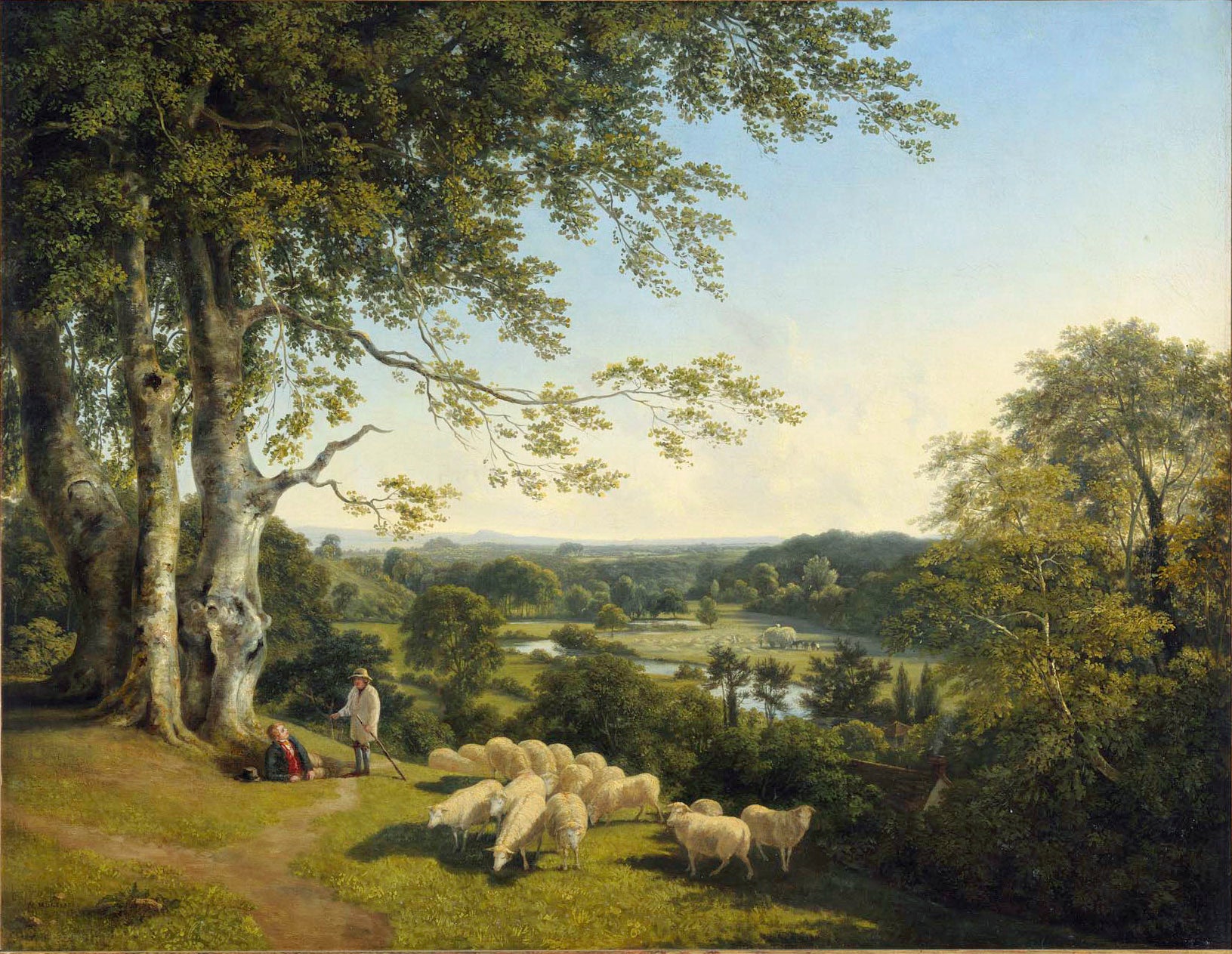
About the Seller
5.0
Recognized Seller
These prestigious sellers are industry leaders and represent the highest echelon for item quality and design.
Platinum Seller
Premium sellers with a 4.7+ rating and 24-hour response times
Established in 2009
1stDibs seller since 2016
184 sales on 1stDibs
Typical response time: 1 hour
Associations
LAPADA - The Association of Arts & Antiques DealersInternational Confederation of Art and Antique Dealers' AssociationsThe British Antique Dealers' Association
- ShippingRetrieving quote...Shipping from: Andover, United Kingdom
- Return Policy
Authenticity Guarantee
In the unlikely event there’s an issue with an item’s authenticity, contact us within 1 year for a full refund. DetailsMoney-Back Guarantee
If your item is not as described, is damaged in transit, or does not arrive, contact us within 7 days for a full refund. Details24-Hour Cancellation
You have a 24-hour grace period in which to reconsider your purchase, with no questions asked.Vetted Professional Sellers
Our world-class sellers must adhere to strict standards for service and quality, maintaining the integrity of our listings.Price-Match Guarantee
If you find that a seller listed the same item for a lower price elsewhere, we’ll match it.Trusted Global Delivery
Our best-in-class carrier network provides specialized shipping options worldwide, including custom delivery.More From This Seller
View AllHerding cattle through a wooded river landscape
Located in Stoke, Hampshire
James Stark (1794-1859)
Herding cattle through a wooded river landscape
Oil on canvas
Canvas Size 18 x 24 in
Framed Size 23 x 29 in
James Stark (1794-1859): A Pioneer in Landscape P...
Category
18th Century Old Masters Landscape Paintings
Materials
Oil
$6,827 Sale Price
37% Off
A pair of Classical landscapes
Located in Stoke, Hampshire
George Smith of Chichester (Chichester 1714-1776)
Landscape with figures resting by a river; River landscape with figures outside a thatched cottag...
Category
18th Century Old Masters Landscape Paintings
Materials
Oil
$10,483 Sale Price
20% Off
A wooded landscape with a traveller on a path
By Charles Towne
Located in Stoke, Hampshire
Charles Towne (1763-1840)
A wooded landscape with a traveller on a path
Signed "By CT" lower left
Oil on canvas
23 1/8 x 19 1/2 in
Provenance
Private Collection, West Sussex
Charle...
Category
Early 19th Century Victorian Landscape Paintings
Materials
Oil, Canvas
$3,255 Sale Price
56% Off
Cattle watering in an open landscape
By Joshua Shaw
Located in Stoke, Hampshire
Joshua Shaw (Billingborough 1776-1860 New Jersey)
An open landscape with cattle watering
signed and dated 'J. Shaw. 1810' lower right
Oil on canvas
Canvas Size 36 x 51 in
Framed Siz...
Category
18th Century Old Masters Landscape Paintings
Materials
Oil
$16,294 Sale Price
24% Off
Cattle grazing in an extensive landscape
Located in Stoke, Hampshire
Tom Coates (1941-2023)
Cattle grazing in an extensive landscape
Oil on canvas
Signed with initials lower left
Canvas Size - 20 x 24 in
Framed Size - 29 x 33 in
Tom Coates (1941–2023...
Category
20th Century Modern Landscape Paintings
Materials
Oil
Italian landscape with Monte Socrate (after Jan Both)
Located in Stoke, Hampshire
Richard Bankes Harraden (1778-1862)
Italian landscape with Monte Socrate (after Jan Both)
Signed and dated 1823 on the reverse
Oil on canvas
Canvas size ...
Category
18th Century Old Masters Landscape Paintings
Materials
Oil
You May Also Like
Landscape with Sheep & Cattle
By George Loring Brown
Located in Milford, NH
A fine landscape with sheep and cattle by American artist George Loring Brown (1814-1889). Brown was born in Boston, Massachusetts, and was apprenticed to wood engravers and illustr...
Category
1830s Landscape Paintings
Materials
Canvas, Oil
19th century English landscape with Oak trees, a stream and sheep on a pathway
Located in Woodbury, CT
19th century English landscape with Oak trees, a stream and sheep on a pathway.
A wonderful classic English landscape dating from the middle of the 19th century. This style of paint...
Category
1860s Victorian Landscape Paintings
Materials
Oil, Wood Panel
19th century English Victorian oil landscape with figures, a stream and trees
By Henry John Boddington
Located in Woodbury, CT
Henry John Boddington.
19th century English landscape with figures by a riverside.
Simply one of the finest quality English landscape Ive ever had the pleasure of owning .
This i...
Category
1850s Victorian Landscape Paintings
Materials
Canvas, Oil
19th Century landscape oil painting of figures with cattle near a country river
By Thomas Thomas
Located in Nr Broadway, Worcestershire
Thomas Thomas
British, (1831-1913)
A Country Idyll
Oil on canvas, signed
Image size: 19.25 inches x 29.25 inches
Size including frame: 28.75 inches x 38...
Category
19th Century Victorian Landscape Paintings
Materials
Oil, Canvas
English Victorian Landscape of a Waterfall
Located in Queens, NY
English Victorian oil painting landscape of a waterfall in a gilt frame.
Category
Antique Late 19th Century British Victorian Paintings
Materials
Paint
Oil Painting by George Arthur Fripp R.W.S "A Woodland Scene"
Located in Mere, GB
Oil Painting by George Arthur Fripp R.W.S "A Woodland Scene" RBA 1813 - 1896. Bristol painter in oil and watercolour of tranquil landscapes. Exhibited att he Royal Academy, Royal Wat...
Category
19th Century Landscape Paintings
Materials
Oil
More Ways To Browse
Antique Waterfall
18th Century Painting Of A Lady
New England Church Painting
Large Pastoral Oil Paintings
Connoisseur Antiques
Thomas Smith Oil
Chichester Painting
Christ Church Oxford
Richard Lane
Sumer Martin
Trevor Brown
St Barts Painting
Thomas T Wilson
George Smith Of Chichester
Painting By Armstrong
Bruce Parks
G S Hill
Mountain Girl
